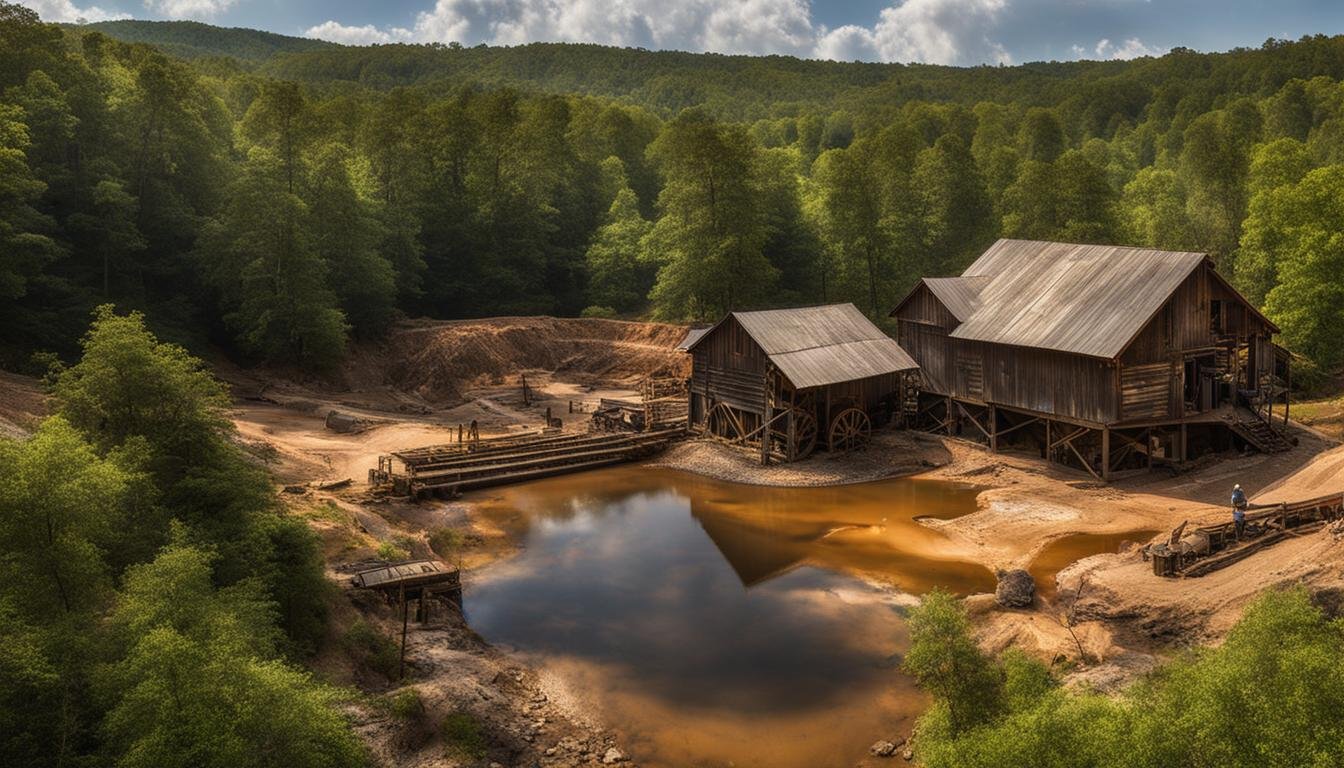Welcome to the fascinating world of gold mining in Alabama!
If you’ve ever dreamed of striking it rich and uncovering hidden treasures, this article is for you.
Alabama has a rich history of gold mining, with a gold rush that took place in the early 1800s. Today, there are still plenty of opportunities for prospectors like yourself to hit the jackpot and find gold in Alabama’s rivers and creeks.
In this article, we’ll dive into the legacy of the Alabama gold rush, explore the best locations for gold panning, learn essential techniques for prospecting, navigate the legal regulations, choose the right equipment, and discover Alabama’s geological hotspots.
You’ll also get a glimpse of the historical perspective of gold mining in Alabama and gain insights into the environmental considerations and the vibrant prospecting community in the state.
So grab your pan and get ready to embark on an exciting journey of gold mining in Alabama. Who knows, you might just be the next lucky prospector to strike it rich!
Key Takeaways
- Alabama has a rich history of gold mining, with a gold rush that took place in the early 1800s.
- Prospectors can still find gold in Alabama’s rivers and creeks today.
- Explore the historical gold mining towns of Alabama and experience their boom and ghost town legacy.
- Discover the best locations for gold prospecting in Alabama, such as the Alabama Gold Camp and the Consolidated Gold Mine.
- Master essential techniques like gold panning, using classifier screens, and reading the river to increase your chances of finding gold.
The Legacy of the Alabama Gold Rush
The Alabama gold rush began in the early 1800s when gold was discovered in the state. This momentous event triggered a flurry of activity, with prospectors flocking to Alabama in search of their fortunes. The legacy of the Alabama gold rush is a testament to the state’s rich history in gold mining and the impact it had on the development of its towns and communities.
The Early 1800s: Alabama’s Gold Rush Begins
In the early 1800s, news of gold discoveries in Alabama spread like wildfire, attracting thousands of prospectors from all over the country. The promise of striking it rich and finding vast quantities of gold drove individuals and families to abandon their homes and make the arduous journey to the goldfields.
During this period, numerous gold mining towns sprouted up across the state, each with its own unique charm and stories. These towns became the epicenters of the gold rush, bustling with activity as miners worked tirelessly to extract precious gold nuggets and flakes.
Historical Gold Mining Towns You Can Still Visit
Today, visitors to Alabama have the opportunity to explore the remnants of these historical gold mining towns. Walking through these towns is like stepping back in time, witnessing the boom and eventual decline of the once-thriving gold mining industry.
Buy Gold Online: The Smart and Secure Way
Discover the safest and most reliable strategies to buy gold online. Make informed investment decisions and secure your financial future today!
Learn MoreOne such town is Goldville, which experienced a period of rapid growth and prosperity during the height of the gold rush. Visitors can wander through the remains of old buildings and imagine the excitement that once permeated the streets.
Another notable town is Hog Mountain, which played a significant role in Alabama’s gold mining history. Although now a ghost town, Hog Mountain offers a glimpse into the past and serves as a reminder of the transient nature of gold mining communities.
| Town | Status |
|---|---|
| Goldville | Ghost town |
| Hog Mountain | Ghost town |
Note: The table above showcases some historical gold mining towns in Alabama that have become ghost towns.
Discover Alabama’s Gold-Bearing Locations
Alabama is a treasure trove for prospectors seeking gold. The state is home to numerous gold-bearing locations, where rivers and creeks have deposited valuable gold particles over time. Whether you’re a seasoned prospector or just starting out, Alabama’s gold-bearing rivers and creeks offer ample opportunities to find that elusive golden treasure.
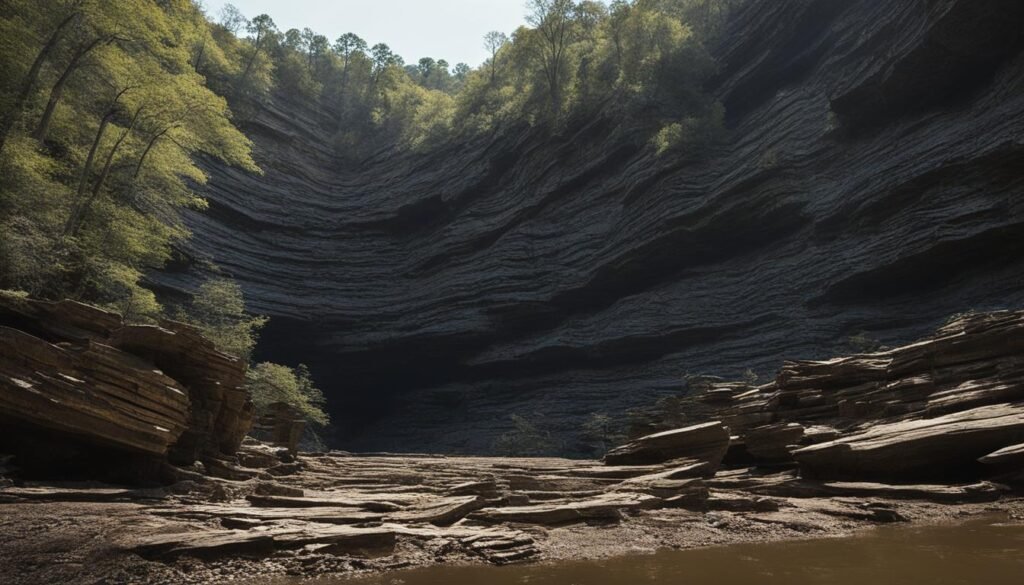
One popular location for gold prospecting in Alabama is the Alabama Gold Camp in Cragford. This privately owned camp provides access to several creeks that are known for their gold-rich deposits. The camp offers campsites, cabins, and the necessary equipment for gold panning, making it an ideal destination for both beginners and experienced prospectors.
Another notable gold-bearing location in Alabama is the Consolidated Gold Mine in Dahlonega. The mine, originally established in the 1800s, offers guided tours that take visitors deep underground to explore the tunnels and learn about the mining history of the area. While you can’t pan for gold at the mine itself, the experience provides valuable insights into the region’s rich gold mining heritage.
The Lilly Pad Campground in Riverside is also worth mentioning. Located near the historic gold mining town of Hog Mountain, the campground offers gold prospecting opportunities along the scenic Coosa River. Prospectors can set up camp, rent equipment, and try their luck at uncovering gold in the surrounding creeks.
These are just a few examples of the many gold-bearing locations in Alabama. By exploring these rivers and creeks, you can immerse yourself in the history and thrill of gold prospecting while enjoying the beautiful natural landscapes that Alabama has to offer.
Essential Techniques for Gold Panning and Prospecting
When it comes to gold panning and prospecting, having the right techniques can make all the difference in increasing your chances of finding gold. In this section, we’ll explore three essential techniques that every prospector should master to maximize their success in the field.
Mastering the Gold Pan: A Prospector’s First Tool
The gold pan is the quintessential tool for any prospector. It’s simple yet effective in separating gold from other materials. To master the gold pan, start by filling it with gravel and water. Then, gently swirl the pan in a circular motion while keeping it tilted slightly forward. This allows the water to wash away lighter materials, leaving behind the denser gold particles at the bottom of the pan. With practice, you’ll learn to spot the glimmer of gold and successfully extract it from the pan.
Sifting Success: How to Use Classifier Screens
While the gold pan is great for capturing larger gold particles, smaller particles can easily be lost. That’s where classifier screens come in. These screens help sift through materials and remove larger rocks, allowing you to focus on the smaller, more valuable gold particles. To use classifier screens, simply pour your material onto the screen and shake it gently. The smaller particles will fall through the screen, while larger rocks will remain on top. This technique helps ensure that you don’t miss any gold during your prospecting process.
Reading the River: Identifying Gold-Prospecting Hotspots
One of the key skills for successful gold prospecting is learning how to read the river and identify gold-prospecting hotspots. Gold tends to accumulate in certain areas of rivers and creeks, so understanding the flow of the water and the natural processes of erosion and deposition can significantly improve your chances of finding gold. Look for areas where the water slows down or changes direction, such as behind rocks or in the bends of the river. These are often prime hotspots for gold deposition. By honing your ability to read the river, you can focus your efforts on the most productive areas and increase your chances of striking it rich.
Now that you have learned these essential techniques, you are well on your way to becoming a skilled gold prospector. With practice and determination, you can navigate the rivers and creeks with confidence, knowing that you have the skills to uncover the hidden treasures that lie within. Keep in mind that gold panning and prospecting require patience and perseverance, but the rewards can be truly golden.
Before engaging in gold mining activities in Alabama, it is important to familiarize yourself with the legal regulations. This includes checking with local authorities or the Alabama Department of Environmental Management to ensure compliance with all necessary rules and obtaining any required permits or licenses. Navigating the legalities ensures that you can enjoy your gold mining adventures without any legal troubles.
If you’re considering venturing into gold mining in Alabama, it’s crucial to understand the legal requirements and regulations governing this activity. These regulations are designed to protect the environment and ensure the responsible management of gold mining operations.
To comply with the gold mining regulations in Alabama, you should start by researching the specific legal requirements set forth by the state. Contacting local authorities or the Alabama Department of Environmental Management is a crucial first step.
Some key legal considerations to keep in mind include:
- Permits and Licenses: Obtain any necessary permits or licenses required by the state of Alabama to legally engage in gold mining activities. Failure to do so can result in fines or other legal consequences.
- Environmental Management: Uphold the necessary environmental management practices specified by regulations. This includes responsible waste disposal, minimizing ecosystem disruption, and preventing pollution of water sources.
- Compliance with Land Use Regulations: Ensure that your gold mining activities are conducted on approved land or private property with the landowner’s consent.
By understanding and adhering to the legalities surrounding gold mining in Alabama, you can enjoy your prospecting adventures while contributing to the preservation of the state’s natural resources. Remember to always stay informed about any updates or changes in the regulations to ensure continued compliance.

Gearing Up: Choosing the Right Gold Mining Equipment
Choosing the right equipment is crucial for successful gold mining. Whether you’re a beginner or an experienced prospector, having the proper tools can greatly increase your chances of finding gold. In this section, we’ll explore the basics of any prospector’s kit, including gold pans and sluice boxes, as well as advanced tools like metal detectors and high bankers.
Gold Pans and Sluice Boxes: The Basics of Any Prospector’s Kit
Gold pans are a fundamental tool for every prospector. They make it easier to separate gold from other materials such as rocks and sediment. By swirling the pan in water, the heavy gold particles sink to the bottom, while lighter materials are washed away. A gold pan is portable, easy to use, and suitable for both beginners and experienced prospectors.
Sluice boxes are another essential component of a prospector’s kit. These long, narrow boxes are designed to process larger quantities of material. As water flows through the sluice box, gold particles get trapped in riffles or mats, while the unwanted material washes away. Sluice boxes are especially useful for processing larger amounts of material, increasing your chances of finding gold.
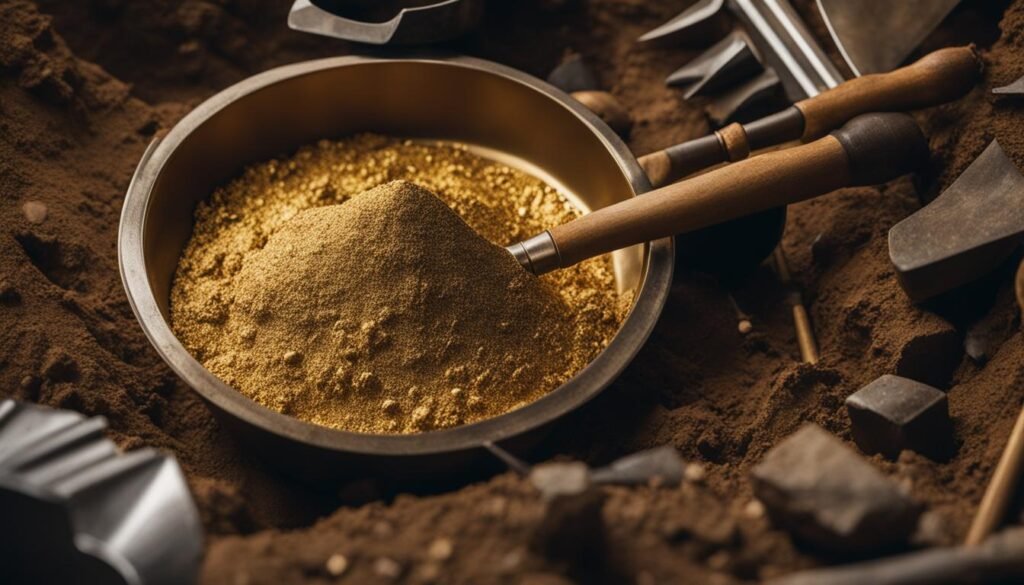
Advanced Tools: Metal Detectors and High Bankers
For more advanced prospectors, metal detectors and high bankers offer additional advantages in the search for gold.
A metal detector is a handheld device that uses electromagnetic fields to detect metal objects, including gold nuggets. It can help you pinpoint the exact location of gold deposits, allowing for more efficient and targeted prospecting. Metal detectors are particularly useful in areas with mineralized soils or where gold is present in smaller quantities.
A high banker is a combination of a sluice box and a water pump. It allows you to process larger quantities of material without the need for manual labor. By pumping water into the high banker, you can wash away unwanted material while retaining the gold. High bankers are suitable for prospectors who want to process larger amounts of material in a shorter amount of time.
Comparison Table: Gold Mining Equipment
| Gold Pans | Sluice Boxes | Metal Detectors | High Bankers | |
|---|---|---|---|---|
| Function | Separating gold from other materials | Processing larger quantities of material | Detecting metal objects, including gold | Washing away unwanted material and retaining gold |
| Portability | High | Low to moderate | Moderate | Low to moderate |
| Suitability | Beginners and experienced prospectors | Beginners and experienced prospectors | Experienced prospectors | Experienced prospectors |
| Efficiency | Good | High | Depends on the model | High |
Now that you have a better understanding of the different types of gold mining equipment, you can choose the tools that best suit your prospecting needs. Whether you opt for the simplicity of a gold pan and sluice box or the advanced capabilities of metal detectors and high bankers, having the right equipment can significantly increase your chances of striking gold.
Unearthing the Gold: Alabama’s Geological Hotspots
Alabama is home to geological hotspots where gold deposits can be found. These hotspots are often located in rivers and creeks, where the natural processes of erosion and deposition have concentrated gold particles. By exploring these geological hotspots, prospectors have a higher likelihood of uncovering gold in Alabama’s abundant natural resources.
Gold Mining in Alabama: A Historical Perspective
Gold mining in Alabama holds a significant historical perspective. The gold rush era in Alabama shaped the landscape and communities of the state, leaving a lasting legacy. Exploring glimpses into the past provides insights into the lives of miners and the techniques they used to extract gold. Additionally, modern-day prospecting continues the golden legacy, allowing prospectors to connect with the state’s rich mining heritage.
Glimpses into the Past: Alabama’s Gold Mining History
The gold rush in Alabama during the early 1800s attracted thousands of individuals seeking fortune and opportunities. This period marked the beginning of gold mining activities in the state, igniting a fervor that led to the establishment of bustling mining towns and bustling communities. Alabama’s gold mining history showcases the determination and resilience of those who pursued the dream of striking it rich.
“The Alabama gold rush was a transformative time for the state, bringing people from all walks of life to the region in search of gold. Miners faced numerous challenges, from harsh working conditions to limited resources, yet they persevered in their quest for treasure.”
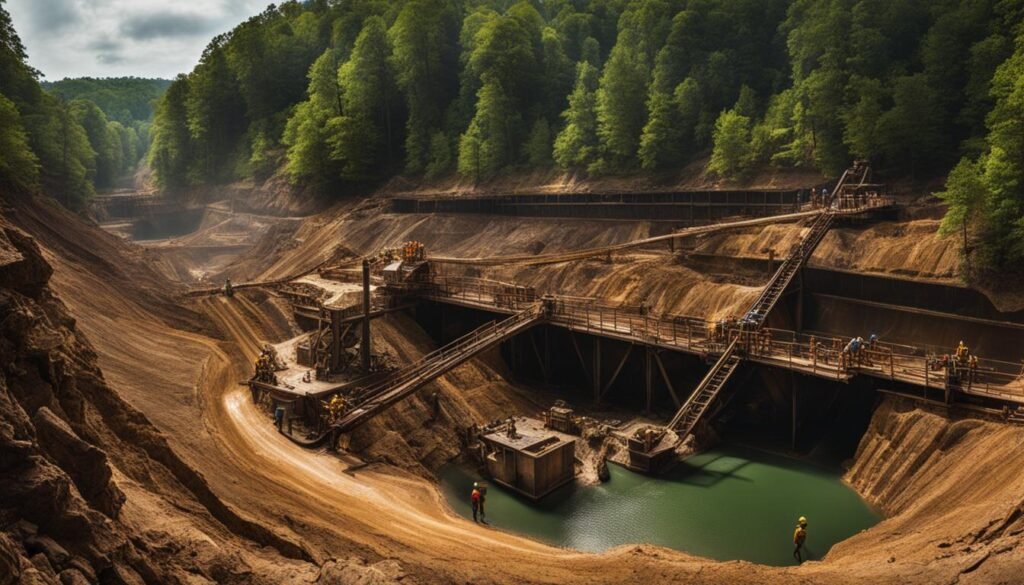
The extraction of gold in Alabama required the use of various techniques and equipment. Miners used basic tools such as gold pans and sluice boxes to separate the valuable metal from the surrounding sediment. Their dedication and skill contributed to the growth and development of the region, leaving behind a rich historical legacy.
Modern-Day Prospecting: Continuation of a Golden Legacy
Modern-day prospecting in Alabama continues the legacy established by the early gold miners. Although the scale and methods have evolved, the passion for uncovering hidden treasures remains the same. The prospecting community in Alabama carries forward the traditions and knowledge passed down through generations, ensuring the preservation of gold mining history.
Today, prospectors can explore Alabama’s rivers and creeks, using advanced equipment such as metal detectors and high bankers to increase their chances of finding gold. The thrill of modern-day prospecting intertwines with the historical perspective, creating a unique experience that connects individuals to the state’s rich mining heritage.
By embracing both the historical and modern aspects of gold mining, prospectors in Alabama have the opportunity to not only search for gold but also appreciate the legacy left behind by those who came before them.
Environmental Considerations in Alabama’s Gold Mining Activities
When engaging in gold mining activities in Alabama, it is essential to consider the potential environmental impact. The use of chemicals such as mercury and cyanide in the past has raised concerns about their effects on groundwater, as well as the surrounding flora and fauna. To ensure the continued protection of the ecosystem, it is crucial to take necessary precautions and minimize the environmental impact while indulging in the prospecting experience.
One of the key considerations is the proper handling and disposal of chemicals used in gold mining activities. Mercury, a commonly used substance in gold extraction processes, can contaminate water sources and pose a threat to aquatic life. Cyanide, another chemical frequently employed in the gold mining industry, can also have detrimental effects on the environment.
To mitigate the impact of these chemicals, it is important to follow best practices for their usage, storage, and disposal. Implementing proper containment measures and employing eco-friendly alternatives when possible can significantly reduce the environmental risks associated with gold mining activities.
Additionally, adhering to regulations set by relevant authorities is crucial in protecting the environment while engaging in gold mining. Alabama has specific guidelines and regulations in place to regulate mining activities and safeguard the ecosystem. These regulations aim to ensure that gold mining activities are conducted responsibly, minimizing the negative impact on the environment and local communities.

Joining the Community: Gold Prospecting Clubs and Events
Are you passionate about gold prospecting and eager to connect with like-minded individuals? Joining a gold prospecting club in Alabama is a fantastic way to expand your network, learn from experienced prospectors, and immerse yourself in the rich gold mining culture. These clubs offer a range of benefits, including access to exclusive claims, organized group trips, and the opportunity to forge lasting friendships within the gold mining community.
Local Prospecting Clubs: Networking with Fellow Enthusiasts
Gold prospecting clubs in Alabama provide a supportive and welcoming environment for enthusiasts of all experience levels. Whether you’re a beginner looking to learn the ropes or a seasoned prospector seeking camaraderie, these clubs offer the perfect platform to connect with fellow enthusiasts.
Through regular meetings, outings, and social events, you’ll have the opportunity to share knowledge, exchange tips and tricks, and form valuable connections with individuals who share your passion for gold mining.
Competitions and Learning: Engaging with the Gold Mining Culture
Gold prospecting clubs in Alabama also organize exciting competitions and learning opportunities that allow you to further enhance your skills and engage with the gold mining culture.
Competitions provide a friendly and competitive platform for prospectors to showcase their expertise, compete for prizes, and celebrate their achievements. Workshops and training sessions hosted by experienced prospectors offer valuable insights, techniques, and guidance to help you become a more proficient gold miner.
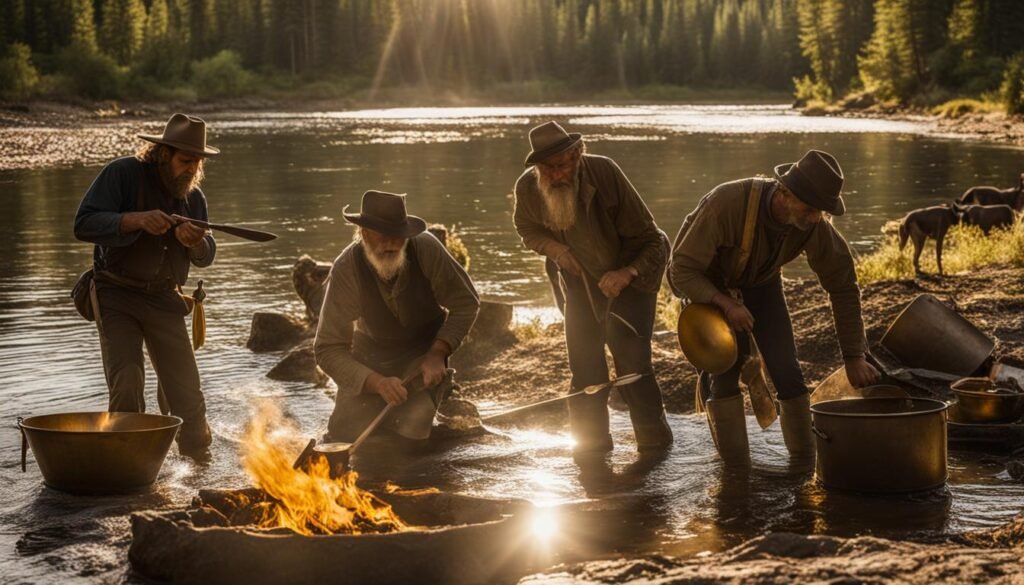
By joining a gold prospecting club in Alabama, you’ll not only gain access to exclusive resources and opportunities but also become part of a vibrant community that shares your passion for gold mining.
The friendships and connections you make within these clubs can last a lifetime, providing you with a support network of individuals who understand and appreciate the thrill of the hunt. Embrace the camaraderie, participate in competitions, and continue learning to fully immerse yourself in the exciting world of gold mining.
Conclusion
Gold mining in Alabama offers a unique and exciting prospecting experience. Whether you’re attracted by the rich legacy of the Alabama gold rush, the thrill of discovering gold-bearing locations, or the challenge of mastering essential techniques, Alabama has something to offer every prospector. By navigating the legalities, choosing the right equipment, and exploring the state’s geological hotspots, you can increase your chances of striking it rich.
But gold mining is more than just a solo endeavor. By joining the gold mining community and participating in clubs and events, you can connect with fellow enthusiasts who share your passion.
These communities provide networking opportunities, access to exclusive claims, organized group trips, and the chance to learn from experienced prospectors. Engaging in competitions and learning events not only enhances your skills but also enriches the gold mining culture in Alabama.
As you embark on your own gold mining journey in Alabama, remember to enjoy the thrill of the hunt and the possibility of uncovering valuable treasures. Whether you’re a seasoned prospector or just starting out, Alabama’s gold mining scene offers endless opportunities for adventure and discovery.
So grab your equipment, explore the rivers and creeks, and embrace the golden possibilities that await you in the Heart of Dixie.
FAQ About Gold Mining in Alabama
What is the legacy of the Alabama gold rush?
The Alabama gold rush shaped the landscape and communities of the state, leaving a lasting legacy. Historical gold mining towns like Goldville and Hog Mountain offer insights into the past and the techniques used by miners during that era.
Where can I find gold in Alabama?
Gold can be found in rivers and creeks throughout Alabama. Some popular locations for gold prospecting include the Alabama Gold Camp in Cragford, the Consolidated Gold Mine in Dahlonega, and the Lilly Pad Campground in Riverside.
What techniques can help me find gold while panning and prospecting?
Mastering the gold pan and using classifier screens to sift through materials effectively are essential techniques for gold panning. Additionally, learning how to read the river and identify gold-prospecting hotspots can increase your chances of finding gold.
What legal regulations should I be aware of before engaging in gold mining activities in Alabama?
It is important to familiarize yourself with the legal regulations surrounding gold mining in Alabama. This includes checking with local authorities or the Alabama Department of Environmental Management to ensure compliance with necessary rules, obtaining permits, and licenses.
What equipment do I need for gold mining in Alabama?
A basic prospector’s kit should include a gold pan and a sluice box. Gold pans are used to separate gold from other materials, while sluice boxes help process larger quantities of material. Advanced tools like metal detectors and high bankers can also increase your chances of finding gold.
Where can I find geological hotspots with gold deposits in Alabama?
Geological hotspots, where gold deposits are concentrated, are often located in rivers and creeks throughout Alabama. Exploring these hotspots will increase your likelihood of finding gold in the state’s abundant natural resources.
How can I learn about the historical perspective of gold mining in Alabama?
By exploring glimpses into Alabama’s gold mining history, you can gain insights into the lives of miners and the techniques they used to extract gold. Additionally, modern-day prospecting continues the golden legacy, allowing prospectors to connect with the state’s rich mining heritage.
What environmental considerations should I keep in mind while engaging in gold mining activities in Alabama?
Gold mining activities have had an impact on groundwater, flora, and fauna in Alabama in the past. It is important to minimize the environmental impact and take necessary precautions to protect the ecosystem while enjoying the prospecting experience.
How can I join the gold mining community in Alabama?
Joining a gold prospecting club in Alabama provides an opportunity to network with fellow enthusiasts and learn from experienced prospectors. These clubs offer exclusive claims, organized group trips, and the chance to build lasting friendships within the gold mining community.
Is gold mining in Alabama a lucrative endeavor?
While there are opportunities for prospectors to uncover gold in Alabama, striking it rich is not guaranteed. The thrill of the hunt and the possibility of finding gold should be the focus of your gold mining journey in Alabama.
Source Links
- https://panfortreasure.com/is-there-gold-in-alabama/
- https://www.identecsolutions.com/news/mining-in-us-70-centuries-of-history
- https://panandprosper.com/panning-for-gold-in-alabama-tips-locations/

